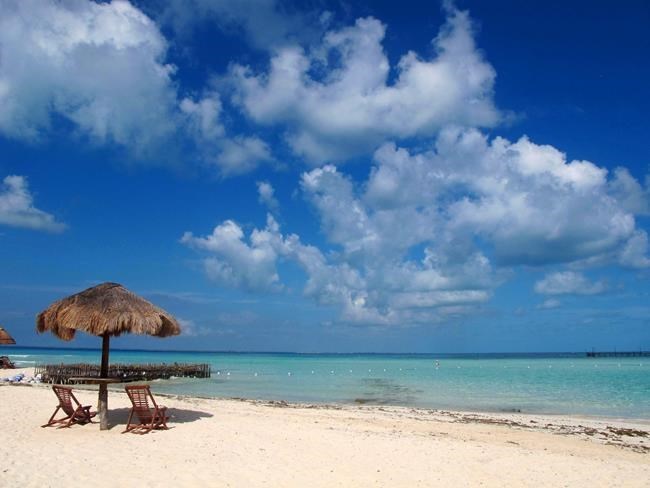
This November 2012, file photo shows the view of the bay off Isla Mujeres in Mexico. THE CANADIAN PRESS/AP/Amanda Lee Myers, File
Republished February 23, 2022 - 1:50 PM
Original Publication Date February 23, 2022 - 9:21 AM
MONTREAL - With the Omicron variant in retreat, Canadians looking to get away for spring break now have a more robust range of travel insurance options.
The federal government announced last week it will roll back testing and quarantine restrictions and lift its blanket advisory against trips abroad, effective Monday.
Although Canada's requirement for pre-departure COVID-19 molecular testing will end on that date, potentially cheaper and easier-to-access rapid antigen tests will be mandatory. Unvaccinated children under 12 will also no longer need to self-isolate upon return to the country.
For insurance seekers, the biggest change will be felt after the travel warning is removed. An insured traveller can now get full medical coverage if they're hospitalized on foreign soil due to COVID-19, as companies add the virus to their polices again after removing or reducing it when Ottawa rolled out its travel warning in mid-December.
"Now there are no riders, no caps on it," said Marty Firestone, president of Toronto-based insurance broker Travel Secure.
If tourists test positive they will still have to wait 10 days before returning to Canada, but it's a cost they can hedge with a relatively new insurance option.
So-called quarantine coverage, which might cover $200 a day for up to 10 days, includes expenses incurred due to a stay prolonged by the pandemic, such as accommodations, food, local transportation and sometimes airfare. It is distinct from trip interruption insurance, which reimburses customers for prepaid travel arrangements that go unused.
However, Firestone says insurers continue to exclude pandemics from their trip cancellation coverage, meaning payments for resort packages or short-term rentals could be lost should border closures resume.
"You still won't be able to claim if your reason for not going is COVID-related," he said, adding that insurance companies may leave out global epidemics indefinitely.
"I think they're all going to cover their behinds a bit here now and never get into that position again ... You are never going to be covered for cancelling a trip because of a pandemic anymore," Firestone predicted.
Airlines sell various forms of trip cancellation coverage to customers who buy a package from them.
Airlines and travel agents say bookings are on the rise again as the Omicron-fuelled surge in cases recedes and Canadians locked at home for much of the past two years clamber for escape to sunnier climes.
Air Canada CEO Michael Rousseau said Friday reservations were ticking upward over the past month. Bookings at travel agencies Flight Centre and Tripcentral.ca rose to between 40 and 50 per cent of pre-pandemic levels in the days leading up to last week's federal announcement, and towered over numbers from the same time last year, when Caribbean flights were halted.
With COVID-19-related cancellations still unviable as a claim, Firestone recommended that groups putting down large deposits hash out a refund agreement with the "end user" — resorts, rental companies, tour operators.
Cruise travel also remains at a Level 4 advisory as the government warns citizens to "avoid all cruises." The notice affects insurance coverage, with days spent quarantining in one's cabin — and paying for it — likely unclaimable, said insurance lawyer Sivan Tumarkin.
Trips prolonged due to a positive test result may be covered for those with certain pre-existing conditions.
Tumarkin's own father opted to stay put for that reason, despite aching for a sunny vacation.
"Because he's 71, he had to answer these additional questions from Manulife. He has underlying conditions, and once I ticked off a few of those, I got to a paragraph that says, 'Well, if you said yes to any one of these things, then he will not qualify," Tumarkin recalled.
"The mindset has shifted from, 'Am I going to be covered for my medical expenses if I get sick abroad because of COVID' ... to, 'What happens if I fly and I can't come back because I test positive?'"
Those relying on their credit cards, particularly older clients, should check the fine print for details like the length of time they're covered while overseas, he added.
This report by The Canadian Press was first published Feb. 23, 2022.
News from © The Canadian Press, 2022